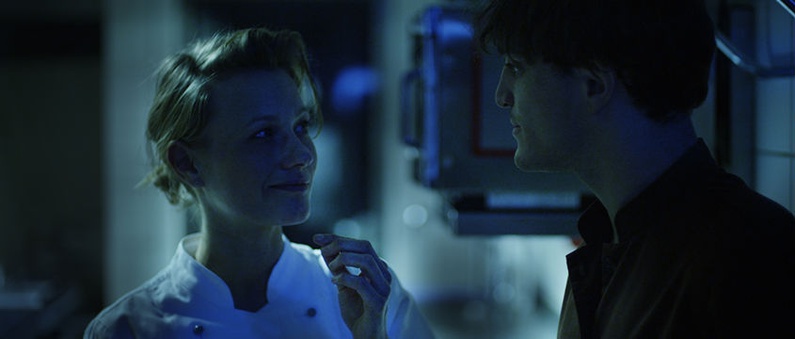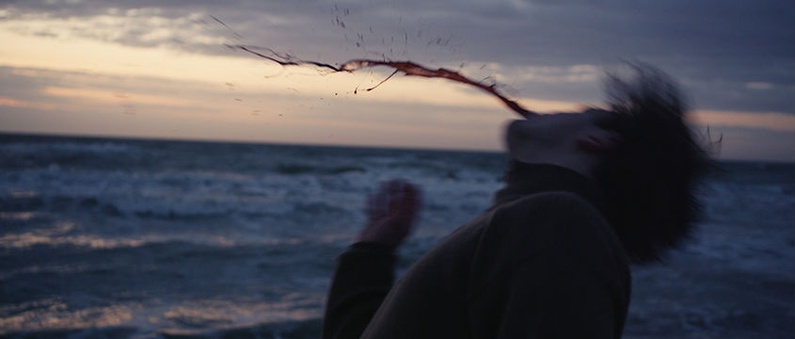
Love Steaks: Fresh blood in the German film scene
Published on
Translation by:
 Danny S.
Danny S.
Schnitzel, blood and body fat folds: dare to set foot in the cinema to see "Love Steaks" (2013), director Jakob Lass' second feature film, and you will hardly be able to stay in your seat. Times have changed. Up-and-coming film makers no longer rise to prominence through depressing rumors and in-depth navel-gazing: "Love Steaks" is a bloody, strange and grandiose celebration.
"You're sweating. A little gross, but okay." Lara mumbles something real quick about "closed rooms" before she disappears through an elevator door and leaves a totally bewildered Clemens behind. Could you imagine a more unerotic opening to a full-length love story? The events that follow in the romantic entanglement between Lara (Lana Cooper) and Clemens (Franz Rogowski) are raw, Love Steaks (2013) being a film that's told through abrasive and at times brutal images; it is also free of clichés and full of reverberating situational humor. Lara and Clemens are both stranded in a luxury hotel on the Baltic Sea - Lara as a trainee in the kitchen where heaps of meat are prepared, and Clemens as a masseur in the meat-tenderizing five star spa. While she flirts with the guys in the kitchen and gets drunk, he pushes around laundry carts and turns down immoral offers from elderly clients.
The official festival trailer of "Love Steaks" (2013), from the director Jakob Lass.
Raw pictures instead of softened effects
How the two--contrary to expectations-- become close is told in Love Steaks through wild, emotional scenes that have absolutely nothing to do with the typical screenplays and softened images of the German mainstream film landscape. "There are too many slick films, in which the use of technology is more important than the story itself. I wanted Love Streaks to have a certain level of rawness. Pretty and idyllic pictures weren't so important," explains Jakob Lass, who drinks a cup of coffee in Neukölln's k-fetisch on a sunny Berlin afternoon with his editor Gesa Jäger. In other words, no artificial lighting, no facades and almost no script. What at first may sound too arthouse for the German cinema public has garnered an unexpected level of success: Love Steaks didn't just win the Förderpreis Neues Deutsches Kino 2013 (Advancment Award of New German Cinema, Ed.) in all four categories, as well as the the Max Ophüls Preis 2014, but was also in line for the Perspektive Deutsches Kino at this year's Berlinale, in addition to being nominated for the Deutscher Filmpreis (German Film Award, Ed.).
 After his first feature-length film Frontalwatte (2011), Jakob wanted to try something radically new with Love Steaks. "At the beginning it was just 'the fat three' - producer Ines Schiller, videographer Tim Schäppi and myself. Through our discussions we came up with the FOGMA rules, which represent the creation of a new type of film." FOGMA, which is loosely based on the Danish Dogma movement, formulates 12 premises under the motto "Rules are Freedom," which range from "FOGMA is the boldness to take risks" to "FOGMA doesn't accept niceness out of social laziness." It's premised on unusual ideas, teamwork, the split from standard cinema conventions and a new type of flow in films. Added to this is that Love Steaks can manage without a previously established script. "Not a single word of dialogue was written. The 'script,' as it were, is only based on an outline that builds a rough skeleton, focusing on the relationship between Lara and Clemens in five phases and 18 scenes," explains Jakob under the sounds of grinding coffee machines and the soft humming of indie rock music.
After his first feature-length film Frontalwatte (2011), Jakob wanted to try something radically new with Love Steaks. "At the beginning it was just 'the fat three' - producer Ines Schiller, videographer Tim Schäppi and myself. Through our discussions we came up with the FOGMA rules, which represent the creation of a new type of film." FOGMA, which is loosely based on the Danish Dogma movement, formulates 12 premises under the motto "Rules are Freedom," which range from "FOGMA is the boldness to take risks" to "FOGMA doesn't accept niceness out of social laziness." It's premised on unusual ideas, teamwork, the split from standard cinema conventions and a new type of flow in films. Added to this is that Love Steaks can manage without a previously established script. "Not a single word of dialogue was written. The 'script,' as it were, is only based on an outline that builds a rough skeleton, focusing on the relationship between Lara and Clemens in five phases and 18 scenes," explains Jakob under the sounds of grinding coffee machines and the soft humming of indie rock music.
FOGMA is the boldness to take risks
Franz Rogowski, Lana Cooper and the employees of the luxury hotel, all of whom aren't professional actors, developed their scenes around this "meatless skeletal outline" among laundry carts, pools and kitchen units. "Franz is a dancer who doesn't have much acting experience and Lana applied for the job of director's assistant," says Jakob. When Lara and Clemens meet among garbage bags in the cellar of the hotel, or romp around the gray, northern German beach, it comes across as both trendy and touching. Could the film have become a failure although the lead actors are so incredibly talented? Jakob disagrees: "The fear that it might be a flop is there with every film. Even if Love Steaks was an improvisational film, it was incredibly important to know how it would end. If you're not sure, then you'll kill yourself on the set!" After all the scenes were filmed, Gesa pieced them together, following the flow of the story rather than knowing the script. "I wanted to see and discover the material through an impartial lens to find out what kind of story was being conveyed," she says between two sips of coffee. "That's why we first created the overall story, which we then realigned with the individual scenes."
Lara also celebrates her savageness in the culinary sphere ("Love Steaks" outtake).
So that no one stands on one's last leg at the end of this process, FOGMA also dictates hierarchies and "compulsory fitness exercises on the set." After all, one doesn't make good films by not eating for weeks and pumping one's body with drugs, but rather, one has to drink water and exercise one's body. Such is Jakob's belief. So, art doesn't always come from collapsing? "I'm strongly convinced that you perform at your peak if you're well and don't exhaust yourself with a 14-hour work day," says Gesa, who, with the two prizes that she won in April at First Time Fest in New York, makes some very convincing arguments for her hypothesis. Because Lara is threatened with physical and mental break-down in Love Streaks through her high alcohol consumption, Clemens has to put on the emergency break, thereby risking not only their livelihoods between cutting boards and massage tables, but also their frenzied relationship. 
FOGMA IS ALMOST LIKE FAMILY
Do Clemens and Lara actually find themselves in the bloody end? You have to go to the cinema to find out. The film team around Jakob and Gesa, however, has already entered into a long-term relationship: "It's nice that we were able to find each other as people, and we definitely want to stay together," says Jakob. "The next project will also be another FOGMA film, in a new format." After all, FOGMA aspires to be a force to be reckoned with in the young German film scene: "We don't want any tristesse like in the Berlin School, but would rather be a countermovement," explains Jakob as he finishes his cup of coffee. "Of course, they have a couple of good films up their sleeve, but there are those that are simply depressing, which don't do much for me." People definitely won't feel like that when they see Love Steaks in cinemas. It's even more than likely that viewers will spring out of their seats and dance the night away-- or bite their lover's lips.
Translated from Love Steaks: Junges Blut im deutschen Kino


